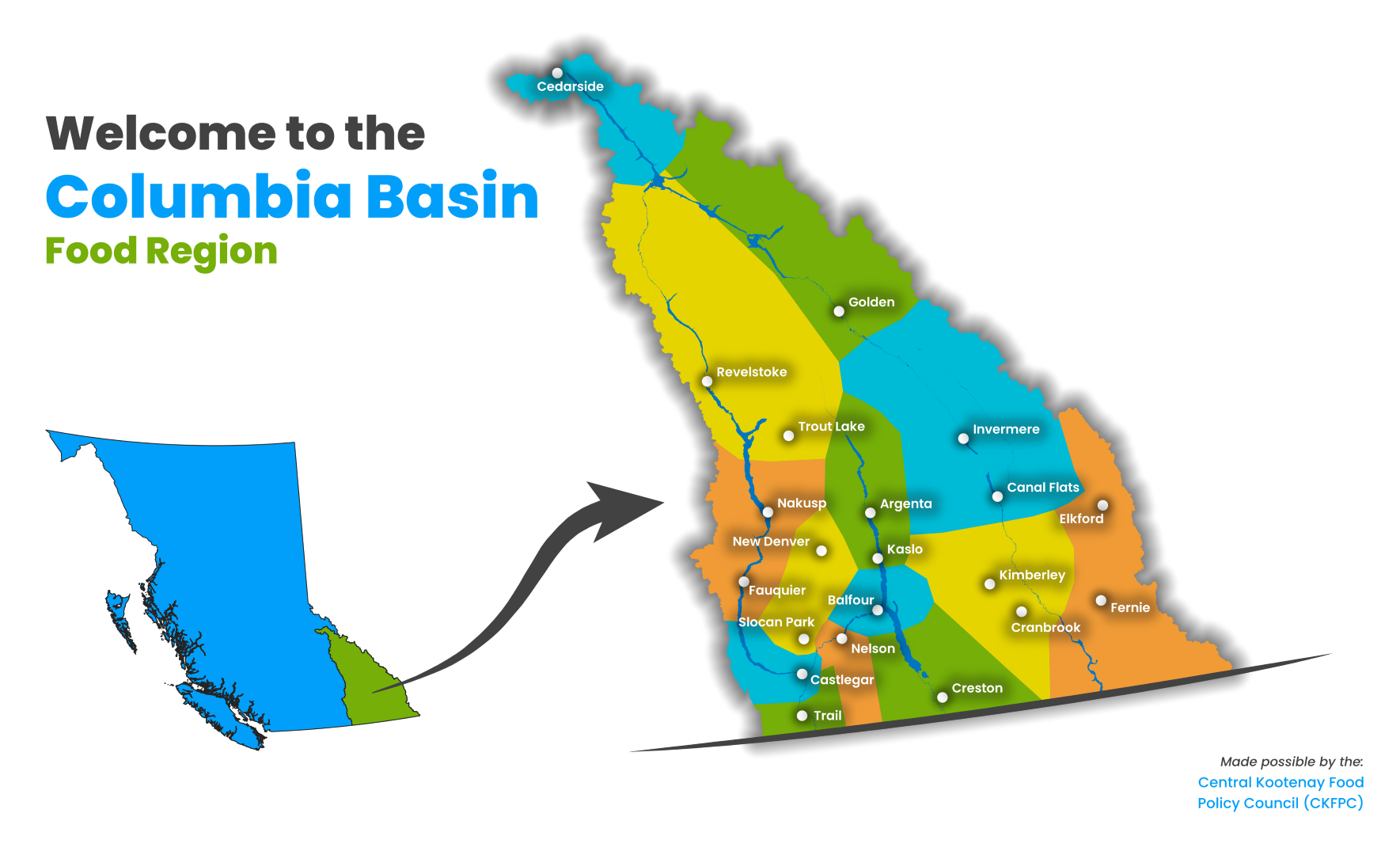
The Columbia Basin in British Columbia, known for its challenging mountainous terrain and seasonal roads, presents unique logistical hurdles in its food supply chain. Despite this, the region thrives with diverse and skilled local food producers
About the Columbia Basin food region
The Columbia Basin region of British Columbia, nestled in the southeastern part of the province, is an area rich in natural beauty and diverse geography. Defined largely by the Columbia River and its tributaries, the basin encompasses a significant portion of the Canadian Rockies, along with the Selkirk and Purcell mountain ranges. This vast and varied landscape is home to a mix of smaller urban centers, and rural communities, each contributing to the region’s unique cultural tapestry. Towns like Nelson, Castlegar, and Trail are notable examples, where a strong sense of community and cultural identity thrives, deeply connected to the land and the outdoor lifestyles it supports.
The region’s geography, while offering stunning vistas and a wealth of recreational opportunities, presents distinct challenges, especially in terms of the food supply chain. The mountainous terrain and the spread-out nature of communities pose logistical hurdles, impacting the efficiency and cost-effectiveness of transporting goods. This is particularly felt in the agricultural sector, where the diverse microclimates allow for a variety of crops and livestock but also lead to fragmented production scales. Small-scale farming, though rich in quality and variety, struggles against the challenges of market access and economic viability. Producers often find themselves competing with larger, more centralized agricultural regions, while grappling with the high costs of operation in relatively remote areas.
In addition to logistical challenges, the Columbia Basin faces the pressing issue of climate change. Shifting weather patterns and the potential for increased natural disasters, such as floods and wildfires, pose significant risks to agricultural stability and food security. This calls for a delicate balance between advancing agricultural practices and preserving the natural ecosystems that define the region.
Moreover, ensuring food security and equitable access to fresh, affordable food remains a critical concern. While there is a growing interest in community-based initiatives like local food co-ops, farmers’ markets, and community gardens, more structured efforts are needed to enhance local food systems. These could include developing infrastructure to support diverse agricultural activities, from storage and processing facilities to innovative distribution networks that bridge the gap between remote producers and consumers.
The Columbia Basin, with its picturesque landscapes and resilient communities, stands at a crossroads. It holds the potential for a vibrant, sustainable food system, but realizing this potential requires collaborative efforts that address the unique geographic, economic, and social challenges of the region. With a focus on sustainable practices, community engagement, and innovative solutions to logistical hurdles, the Columbia Basin can cultivate a food supply chain as rich and diverse as its landscape.
About the Central Kootenay Food Policy Council
From ckfoodpolicy.ca:
“The Central Kootenay Food Policy Council brings people, ideas and information together to build a food secure region with a vibrant, resilient and just regional food system.
We coordinate information sharing and networking groups for food systems organizations in the region, provide public education on the local and global food system, undertake local food systems research projects, manage the regional Farm & Food Directory and a regional food distribution map, and make policy recommendations that enhance the vibrancy and resiliency of the food system in the Central Kootenay.
The Food Policy Council’s geographical scope includes both municipal and rural areas within the Regional District of Central Kootenay. The regional scope is especially important in food-systems related research and decision-making, as a food system is an interconnected web of people and businesses throughout a large area. The activities of our regional food system include production (fishing, farming, gardening and hunting), processing (personal or commercial), distribution, access (generally through grocers, markets, direct from the producer, emergency food providers), consumption and food waste.
The Council reflects the diverse regions and population of the Central Kootenay. Each Council member serves as a vital conduit for information exchange between their respective sector and community and the Food Policy Council. With Council members that reside across the region and that are engaged in many facets of our food system, our collective relationships, knowledge and experience help identify and create solutions that are not possible alone.
The Council meets 5 – 6 times per year and the meetings are open to the general public. We have an Executive Committee who meet in the months between full Council meetings and oversee the work of the Executive Director. Our AGM is held in the spring and is hosted at various locations across the region (when possible to meet in person).
We know that when you bring intelligent, caring and passionate people to a table, great things will happen – especially if there is food involved!”